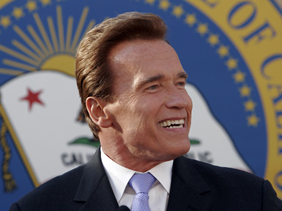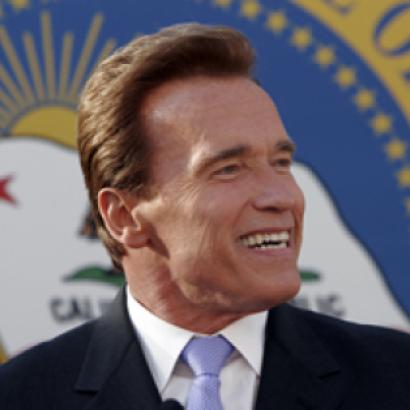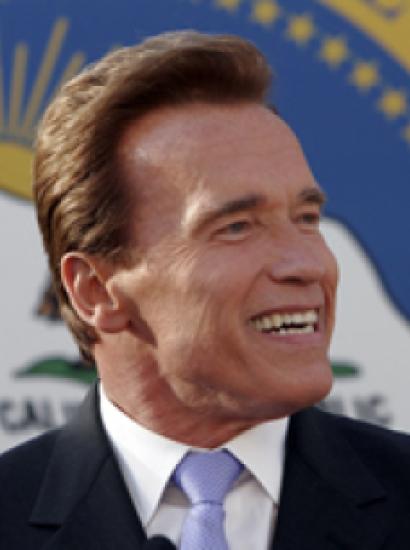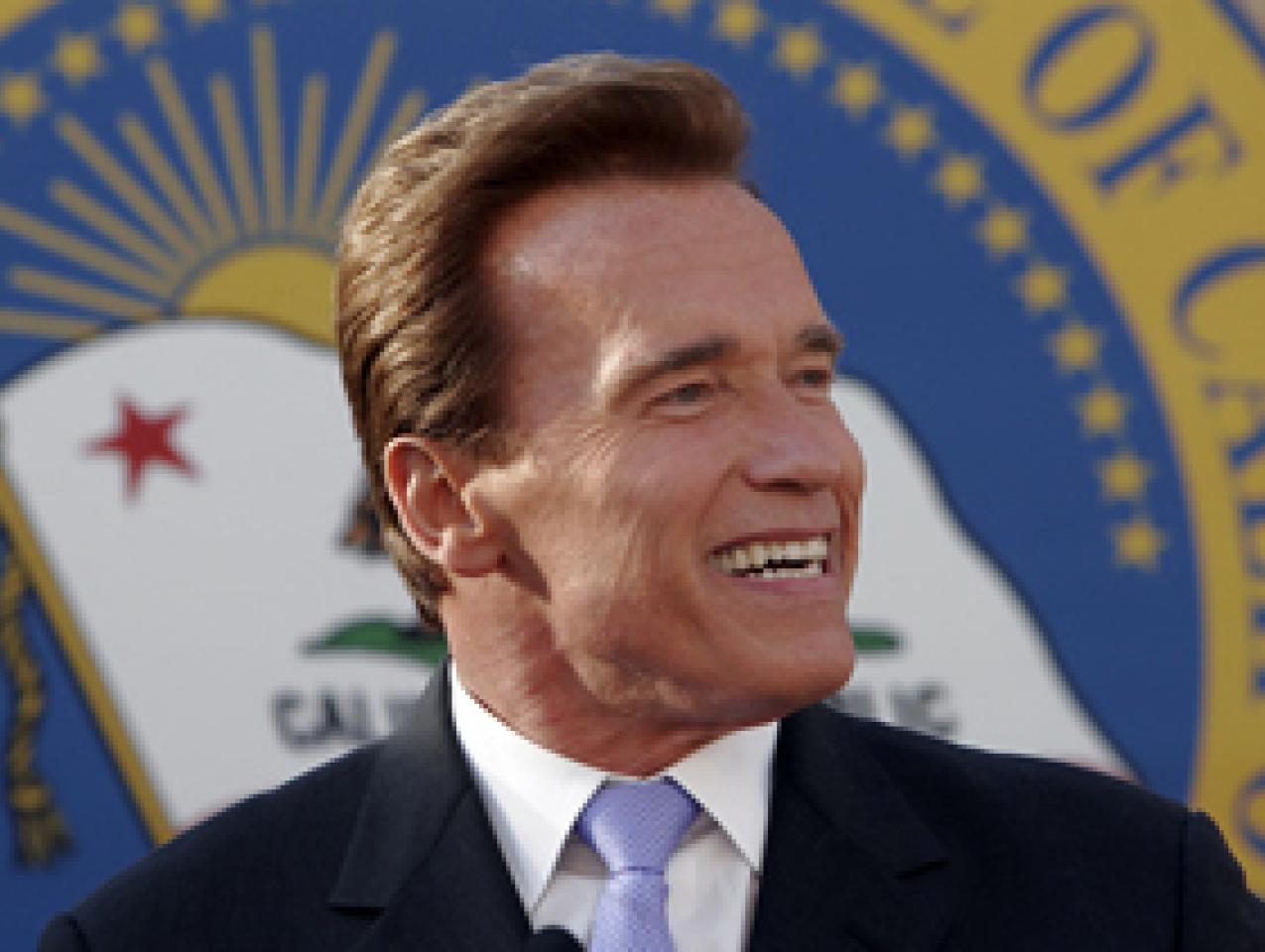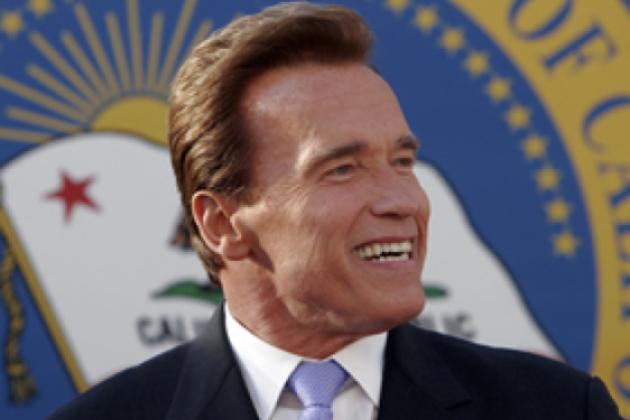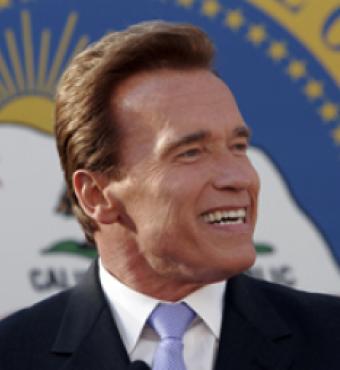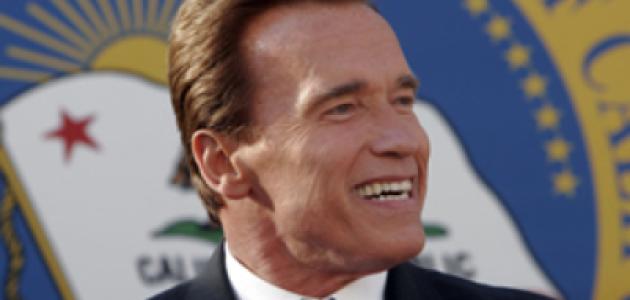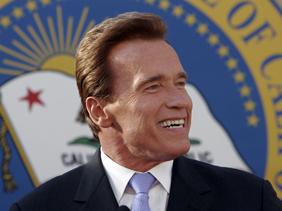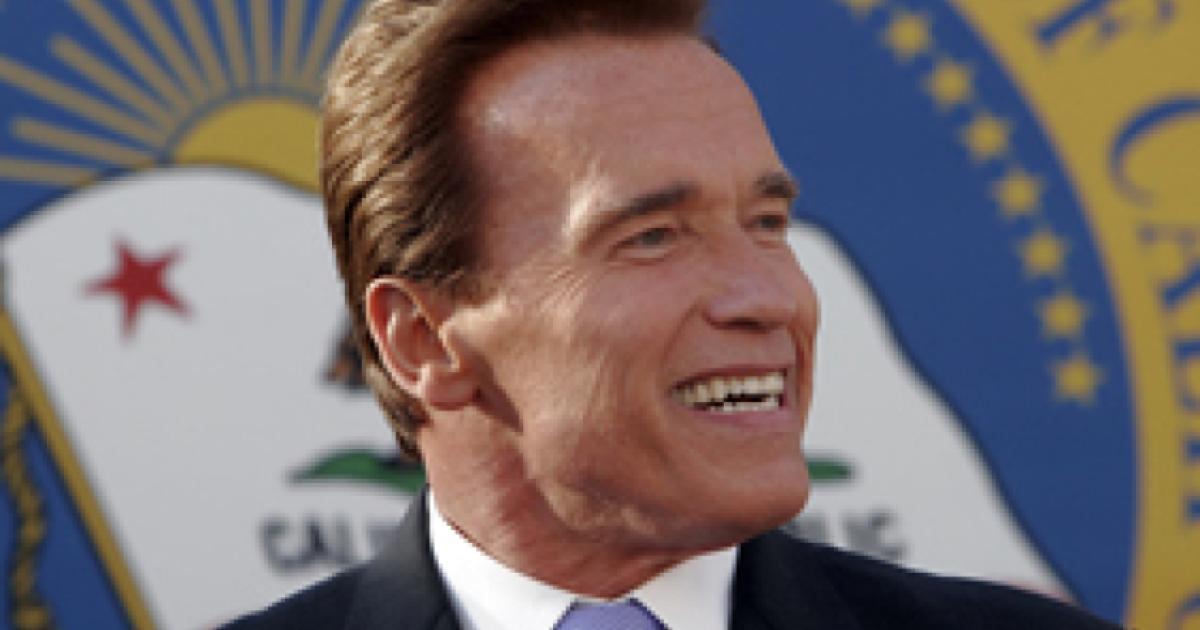In the spirit of the Beatles suddenly topping the musical charts again (thanks to the wonders of artificial intelligence), it was 20 years ago today that . . . no, Sergeant Pepper didn’t teach the band to play, but a different act took the stage in Sacramento.
That ensemble? The administration of Arnold Schwarzenegger, who this Friday will celebrate the 20th anniversary of his swearing-in as California’s 38th governor.
About that seemingly improbably yet terribly cinematic moment in California political history: for a moment, a larger-than-life figure seemed poised to seriously alter the way the Golden State’s government went about its business.
Or so the “Governator” (an homage to Arnold’s trademark Terminator movies) promised in his first inaugural address. “In recent years, Californians have lost confidence. They’ve felt that the actions of their government did not represent the will of the people.”
The newly minted governor added: “This election was not about replacing one man; it was not replacing one party. It was about changing the entire political climate of our state.”
And with those words began one of the more quizzical seven-year stints in California politics, with Schwarzenegger at first triumphing (his victory in October 2003’s gubernatorial recall election) and then faltering (his ballot measures roundly rejected in a 2005 statewide special election), only to rise from the political ashes (his 2006 reelection in a landslide as he led the charge on climate change) and then stumbling again in the final days of his time in Sacramento (a record-low approval rating and a fiscal emergency prompted by the Great Recession).
I’ll leave it to political scientists, pundits, and journalists to discuss Schwarzenegger’s gubernatorial legacy. Meanwhile here are three Arnold-related items for your consideration.
Republican . . . or Independent? Twenty years after Schwarzenegger’s first campaign for office, the tendency still exists to turn to celebrities as the cure for what ails American politics. How else to explain the media’s continuing fascination with Dwayne “The Rock” Johnson as a presidential candidate—“The Rock,” like Arnold, a movie action hero but unlike Arnold, constitutionally eligible for the highest office in the land.
The question, looking at the 2003 recall election in hindsight: what happens were Schwarzenegger to have run for governor not as a Republican but instead as an independent?
There’s a historical parallel in Hiram Johnson, the fabled California governor who was reelected in 1914 as an independent (he previously won the office as a Republican then left the party as part of Theodore Roosevelt’s third-party effort in 1912’s presidential election).
In order to run as an independent, Schwarzenegger first would have needed a rationale for parting ways with the GOP. Keep in mind: this would have been a dozen years before Donald Trump began his dominance of Republican presidential politics and only 13 months before George W. Bush became the last Republican candidate to win the presidential popular vote in this century.
In other words: it’s not the same party that presently vexes Schwarzenegger. (After the Jan. 6, 2021, riot on Capitol Hill, Arnold called Trump “the worst president ever,” compared the unrest to Nazi violence, and said “spineless” GOP members of Congress were “complicit” with the insurrection.)
And there’s the question of finding votes had Arnold gone the independent route.
In October 2003, California’s registration by political party broke down as follows: 43.7% Democratic, 35.3% Republican, and only 16% “decline to state.” Those numbers today: 46.8% Democratic, 23.9% Republican, and 22.2% “no party preference.”
In winning the recall election, Schwarzenegger walked away with 48.6% of the statewide vote—and that’s with fellow Republican Tom McClintock (now a congressman) receiving 14%. As an independent, perhaps Schwarzenegger and his message (more on that in a moment) would still have appealed to California Republicans. But if those same voters hypothetically were offended by Schwarzenegger bailing on that party? Maybe he still would have won the recall election but perhaps not by the same mandate-suggesting, 17-point margin over Democrat Cruz Bustamante.
The “Action Governor’s” Action. Let’s go back to that inaugural address and these promises from the new governor: “As soon as I go inside the Capitol behind me, I will sign my first order as governor. I will sign Executive Order No. 1—which will repeal the 300% increase in the car tax.”
But Arnold didn’t stop there: “I will issue a proclamation convening a special session of the legislature to address California’s fiscal crisis. I will issue a proclamation convening a special session to reform our workers’ compensation system. I will call on the legislators to repeal SB 60 (granting driver’s licenses to California’s undocumented residents), and I will work to reform government by bringing openness and full disclosure to public business.”
Schwarzenegger got his way on workers’ comp. The legislature reversed course and repealed SB 60—the first time in five years that a significant Republican piece of legislation came to fruition. Indeed, during Schwarzenegger’s tenure, he made legislative choices one would expect of a pro-business Republican governor: of the 67 bills approved by the legislature and deemed “job killers” by the California Chamber of Commerce, Schwarzenegger vetoed all but four.
So why then did more conservative California Republicans consider Arnold a disappointment?
It could be that some GOP voters didn’t understand that Schwarzenegger was a political work in progress. Unlike Ronald Reagan, he didn’t experience a political epiphany. Instead, Schwarzenegger was a newcomer to California politics who underwent a political evolution the more he became embedded in California society.
I learned this personally in 2001, when I was one of several individuals who helped Schwarzenegger gear up for what would eventually become a campaign the following election year for Proposition 49 (providing state funding for after-school programs). At one point, I was asked to help draft a speech for Schwarzenegger to deliver in Sacramento, soon after the 9/11 attacks on America. What I suggested: a tough-talking boilerplate speech for a potential Republican gubernatorial candidate. What Arnold delivered instead: a humbler oration in which he admitted that many of his preconceived notions about self-sufficiency were wrong. In retrospect, it should have been a warning to those within earshot that should he ever take office, a Schwarzenegger administration wouldn’t be brawling action movie come to life.
One other aspect of Schwarzenegger’s personality that California Republicans should have taken to heart: the movie tough guy who didn’t negotiate with bad guys on the screen liked to do deals inside the State Capitol—and really liked to be popular.
One such example: Schwarzenegger’s first-year decision to sign a bill banning foie gras in California (for our noncarnivorous readers: the fattened livers of geese and ducks who are typically force-fed).
It’s not that the bill’s author, former state senator John Burton, was the most rational lawmaker in Sacramento, with Burton at one point saying of foie gras cultivators: “I’d like to sit all one hundred of them down and have duck and goose fat —better yet, dry oatmeal—shoved down their throats over and over and over again.” However, Burton just happened to be the State Senate’s president pro tempore, which meant Arnold needed a solid working relationship in order to push his agenda. Translation: the foie gras ban, annoying though it may have been to some California gourmets, was the cost of doing business with a stubborn foe.
Fame Fortune Is Fleeting? As mentioned earlier, Schwarzenegger didn’t have a pleasant final year in office. In addition to dealing with the fiscal mess in Sacramento, the governor drew blows to his vanity in his rough treatment in the race to succeed him.
During California’s 2010 gubernatorial race, Democrat Jerry Brown, who’d end up succeeding Schwarzenegger for the next eight years in Sacramento before giving way to Gavin Newsom, released an ad titled “Echo” in which Republican Meg Whitman quoted Schwarzenegger nearly verbatim on the campaign trail. In one ad segment Schwarzenegger says, “insanity is doing the same thing over and over again and expecting different results.” Followed by Whitman saying: “Insanity is the same thing over and over again and hoping for different results. A different version of ad has Schwarzenegger saying: “I entered this office beholden to no one except you,” while Whitman says, “I will owe my office to no one but you.”
Whitman’s response wasn’t exactly a hearty embrace of the incumbent: "Gov. Schwarzenegger did a number of good things, but he was primarily an actor, he was primarily investor, and I think missed a lot of the key things that could have been done." Schwarzenegger’s take? His “delivery of the lines was much better in the commercial than hers.”
Despite his anemic poll numbers, Schwarzenegger still had political clout. In that last year in office, he succeeded at getting Proposition 14 on the ballot (approved by voters, it created the Golden State’s current top-two primary system). Another concept that Schwarzenegger championed—placing a citizens’ panel in charge of California’s congressional redistricting—also came to pass in 2010 with the success of that year’s Proposition 20 (Schwarzenegger would go on to advocate for redistricting reform beyond California in his postgubernatorial years).
Still, the fact that an A-list celebrity-turned-governor could see his luster wane—especially a “forever optimist” like Schwarzenegger—should serve as a cautionary tale to the man currently holding the job: Gavin Newsom.
Per this recent Berkeley IGS Poll, Newsom’s approval rating among California voters has dropped since February to its lowest level on record (from 55% to 44%). A quick glimpse at that poll shows Newsom receiving only 38% approval among moderates, down from 51%, and 15% less popularity among California voters ages 18–29.
So why Newsom’s decline in a solid-blue state? It could be something as simple as buyer’s remorse. In this case, that would be voters not caring for the term-limited Newsom’s ongoing flirtation with national politics—a political “dance of the seven veils” arguably made worse by Newsom not actually running for the White House but instead hovering over the presidential race, if for no better reason than to stay in the news and remind fellow Democrats that he’s available should President Biden have a change of heart.
It’s that “shadow” campaign that’s annoyed at least one prominent Democrat, with Pennsylvania senator John Fetterman recently telling an Iowa crowd: “There are two additional Democrats running for Pennsylvania, excuse me, running for president right now. One is a congressman from Minnesota, the other one is the governor of California, but only one has the guts to announce it.”
Why this pertains to Schwarzenegger: the peril of California governors wearing on voters’ nerves the longer their stay in office. Case in point: Jerry Brown, who twice ran for president (1976 and 1980) before running for the US Senate in 1982, in the final year of the first of his eight-year stints as governor. Brown lost that race by nearly seven points to Republican Pete Wilson and, to his credit, seemed to understand the mood of the electorate: “I believe the people of California would like a respite from me, and in some ways I would like a respite from them,” Brown said after his loss.
Such defeatism won’t be the mood when Schwarzenegger and his former staffers and supporters gather in Sacramento this week to celebrate the 20th anniversary of his first inaugural. It also comes at a time when Schwarzenegger is cheerily reintroducing himself (and his menagerie in his Los Angeles estate) to the public with this summer’s Netflix documentary and this fall’s self-help book.
Not that he’ll ever be a gubernatorial candidate again, but Arnold Schwarzenegger’s return to Sacramento after leaving the town nearly a dozen years ago maybe serves as a handy reminder to another governor: now’s a good time to focus on your day job.







